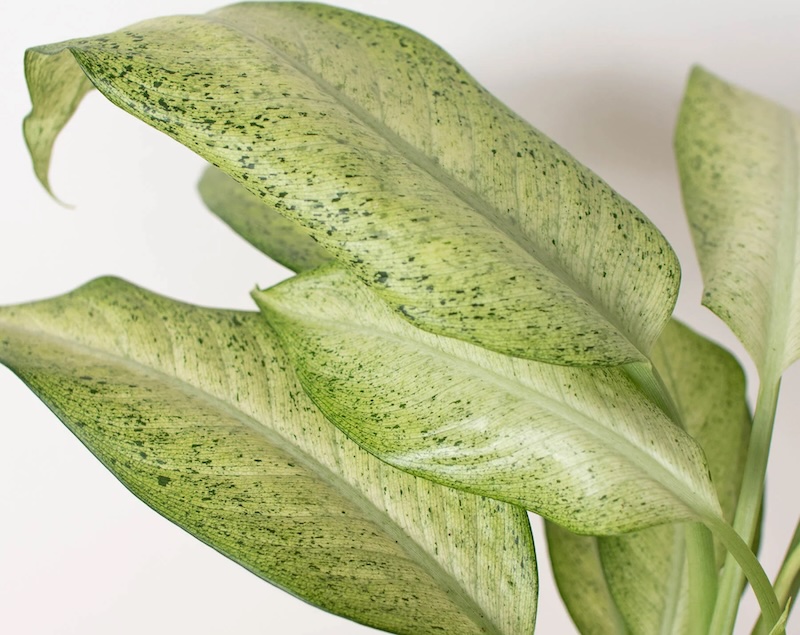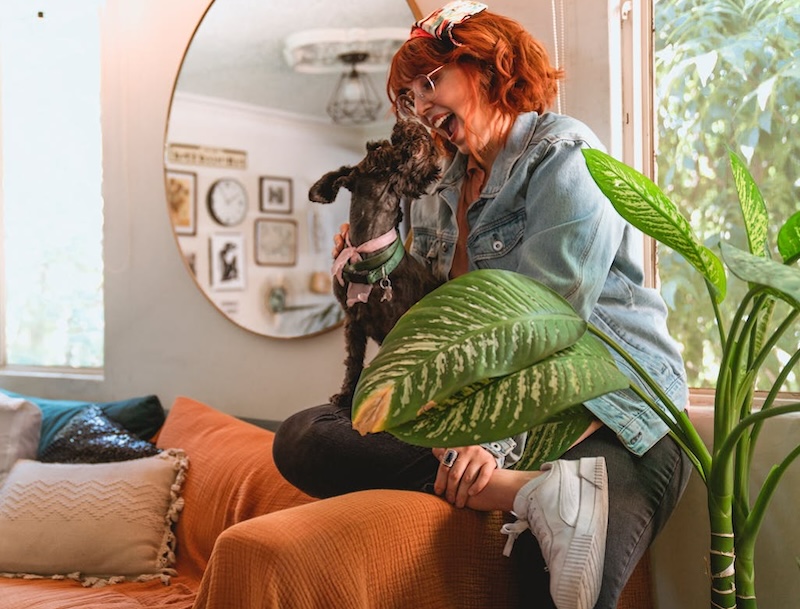Dieffenbachia are fabulous architectural plants to grow indoors where the elaborate variegated leaves can be used to decorate a living room, entryway, or bedroom. The large leaves have been scientifically proven to help purify the air indoors by clearing toxic fumes from indoor furnishings or urban pollution. However, caution should be used when growing Dieffenbachia in areas accessible to either children or pets.
Dieffenbachia leaves and stems contain a milky sap, which can cause a reaction if ingested or rubbed on the skin. The sap contains oxalates that are moderately toxic. In rare cases, eating Dieffenbachia can cause airways to become obstructed, resulting in death.

Is Dieffenbachia Poisonous to Children?
Small children and babies are more likely than older children to put objects in their mouths and could experience extreme irritation from direct contact with the milky sap. Even exposure to small amounts can result in irritation that could last for hours.
Is Dieffenbachia Poisonous to Dogs?
Dogs are likely to experience irritation if they ingest any part of the plant or lick at the plant’s sap. Contact with small amounts can produce an immediate reaction. The size and breed of the dog do not determine the severity of the reaction. Signs of exposure include drooling, redness of the mouth or tongue, stomach upset, vomiting, stomach bloating, swelling of the throat, and difficulty breathing.
Contact your veterinarian immediately if your dog is having trouble breathing. Antiinflammatory drugs or antibiotics may be needed to heal any affected areas so that your dog can resume eating.

Is Dieffenbachia Poisonous to Cats?
Curious cats will give many different houseplants a nibble. Unfortunately, dieffenbachia can cause injury with just a few bites. Cats will exhibit many of the same symptoms as dogs and humans. Immediate veterinarian attention will be needed if your cat or kitten shows signs of trouble breathing or eating. The most common reactions to the milky sap include excessive drooling, redness of the mouth or tongue, abdominal pain or bloating, and swelling of the throat.
Is Dieffenbachia Poisonous to Other Animals?
Other small housepets such as mice, guinea pigs, hamsters, or ferrets can have the same reactions that dogs and cats have to the sap of Dieffenbachia, although they are less likely to chew or lick the plant. Keeping these animals out of the area where the plant is growing is the best way to protect these small animals.
Symptoms Of Dieffenbachia Poisoning
Always check with your doctor, veterinarian, or local poison control hotline for guidance if you suspect Dieffenbachia poisoning. The following symptoms are the most common to look for and are in order of increasing severity.
- Pain or swelling in the mouth or other body part exposed to the plant’s sap
- Excessive drooling
- Difficulty swallowing
- Severe eye irritation if the sap is rubbed in the eyes, possibly leading to permanent damage
- Difficulty breathing
Preventing Dieffenbachia Poisoning
The best way to prevent poisoning from Dieffenbachia is to keep the plant away from any curious children or family pets. Wear long sleeves and gardening gloves when handling the plant to keep the sap away from skin and eyes. Always dispose of damaged or cut plant parts immediately and do not leave them laying around where children or pets can find them.
Pet Poison Helpline
If something were to happen to your furry friend, and you suspect that they are suffering from Dieffenbachia poisoning, there is a poison control hotline to call for 24/7 vet advice. It is called the Pet Poison Hotline, and their phone number is (855) 764-7661.
Sources:
"Dieffenbachia and Philodendron: Two Popular but Poisonous Houseplants." National Capital Poison Center. poison.org
"Dieffenbachia poisoning." Icahn School of Medicine at Mount Sinai. mountsinai.org
"Dieffenbachia." American Society for the Prevention of Cruelty to Animals. aspca.org
 |
Author Robbin Small - Published 11-30-2023 |
